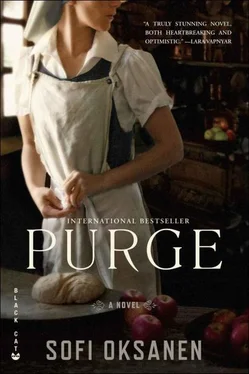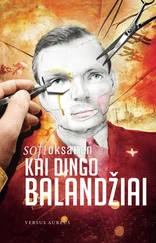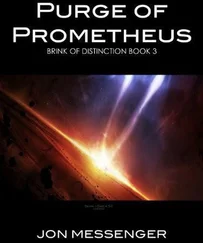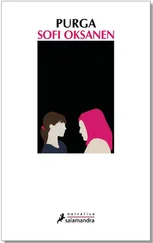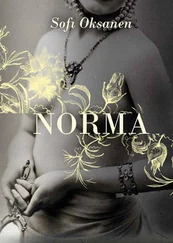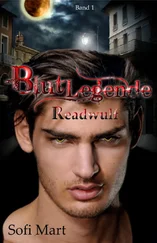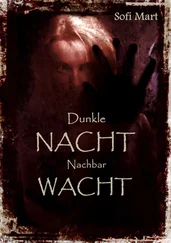Free Estonia!
I wonder if that’s what Martin is still doing here in the countryside. Why is he here, if he’s on such good terms with the party? Shouldn’t he be some kind of honcho in Tallinn by now? That’s the impression I got from Liide, anyway-that all of those people are in powerful positions now. Doesn’t Liide wonder about it at all? Or are they going to Tallinn and she doesn’t want to tell me? I’ll try asking her again about Martin’s brother-but she always acts strange when I start talking about Martin. She gets all aggravated, acts as if I were accusing her of some evil deed.
Salt herring makes me thirsty. I wish I had some of Ingel’s beer. I can’t tell day from night in here. I miss the sunrise over the fields. I listen to the birds hopping around on the roof and I miss my girls. I don’t know if I have a single friend left alive.
Hans Pekk, son of Eerik, Estonian peasant
Läänemaa, Estonia
Aliide Packs Up Her Recipe Book and Gets Ready for Bed
The taillights receded into the distance. The girl had been in such a hurry that it had been easy to get her into the taxi, although she kept muttering something. Aliide had reminded her that someone might come looking for Pasha and Lavrenti at any moment-the need to hurry was as urgent as ever. It would be best if she made it to the harbor before anyone started wondering where the men had disappeared to.
If the girl made it home, she would tell Ingel that the land she lost long ago was waiting for her. Ingel and Linda could get Estonian citizenship. They could even get a pension and, once they had a passport, the land. Ingel was coming back, and Aliide couldn’t do anything to stop her anymore. And why wouldn’t the girl survive? They’d found her passport in Pasha’s pocket, and the roll of dollars would pay for a lot more than a taxi to Tallinn-like an expedited visa so she wouldn’t have to find a truck to hide in when she got to the harbor. The girl’s eyes had been wide, like a skittish horse, but she would be all right. The taxi driver had got such a thick wad of bills that he wouldn’t ask her any questions about her trip.
Since she was a descendent of Ingel and Linda, she could get an Estonian passport, too. She wouldn’t ever have to go back to Russia. Should Aliide have told her that? Maybe. Maybe she would figure it out for herself.
Aliide went into the back room and got a paper and pen. She was going to write Ingel a letter. Tell her she could get all the papers she needed to come back at the notary, that she and Linda could move in at any time. She told her the cellar was full of jam and preserves, made according to their old recipes. It turned out she had become quite good at it, even if Ingel had never believed in her cooking skills. She’d even become a braggart about it.
She could see Pasha and Lavrenti’s boots through the doorway.
Were the boys already on their way here-the ones who sang the songs? Did they already know that Aliide was alone now?
Aino’s boys could get her some gasoline. She would give them all the liquor in the cabinet and anything else they wanted in the house. Let them take it all.
She put her notebook of recipes in the envelope with the letter.
She would send the letter tomorrow, then get the gasoline and douse the house with it. After that, she would have to tear up the floorboards in the little room-it would be hard, but she could do it. Then she would lie down beside Hans. In her own house, beside her own Hans. She might get it done before the boys came, or did they plan to do tonight whatever it was they planned to do?
Free Estonia!
When I was in the woods, I met a man there. It was Liide’s husband’s brother-Martin’s brother. He was all mixed up. A Communist. I strangled him.
He'd said he had been in New York with Hans Pöögelmann. They organized the Communists there and published the New World newspaper. They were those kind of men. It was a little bit difficult to make sense of his stories; his head whipped around so much that he just stammered, and sometimes he just stopped talking completely, with the spit flying. At first I thought he was some kind of wild animal scrambling past my dugout. Of course he didn’t know about my dugout. His foot went through my trip wire-that’s how I knew something was there. I didn’t go after him right away. I waited until night came and then went to see if there were any tracks. He’d been eating blueberries from nearby-not the way an animal eats at all. That’s how I knew it must have been a person. But he was able to keep so quiet that I didn’t see anything until he had me by the legs. He was an animal-he had those animal eyes-but not much strength, and I quickly pinned him, sat on his chest, and asked him who he was. He howled at first, and I had to hold his mouth shut, but then he calmed down. I had a little bit of rope with me, and I tied his hands just to be safe. He didn’t have any weapons-that was the first thing I checked. I managed to make out that his name was Konstantin Truu. I asked if he was related to Martin Truu. He was. I didn’t say anything about how that meant we were related, because I would never acknowledge a Commie relative. I just said that Martin Truu was known in the village, and Konstantin was delighted-or maybe he was afraid; it was hard to tell from his behavior. He got very worked up, anyway. He started talking about a great misunderstanding that Stalin should be informed of. I sort of suspected that his stutter was a put-on. You see all kinds of people you shouldn’t trust running around in the woods. He asked for help, asked for some food. He was probably one of those city sissies who can’t survive in the woods. The NKVD sends out all kinds to hunt for us Estonian boys. But I heard his story to the end. I thought I might find out something about Liide’s husband. Maybe this Konstantin was actually an agent, and he just went berserk out in the forest. Maybe some kernel of truth would slip out of his mouth.
He had come back from America with Pöögelmann and gone to Russia to work for the Soviets. Then he came back to Estonia with some friend, and his friend was shot at the border, but Konstantin made it to Tallinn. He messed around with the Communists there, but then they wanted to send him to Siberia. So he ran away and came to the forest. He didn’t know what year it was-he just wanted to get a message to Stalin about this misunderstanding that had to be corrected. Then I strangled him. He had seen me alive when I was supposed to be dead.
I searched his pockets. There were letters in them. Letters Martin sent to him when he was in New York. I took them with me and read them. I planned to give them to Liide, but I didn’t do it. There’s no point in making her any more afraid than she already is. I hid them here under the floorboards in the same place that I keep this journal. It wouldn’t be good if anyone found them. Letters like that can get you sent to Siberia, even if they were sent in the thirties. I wonder what Martin had to do to avoid being sent there. Does he even know that his brother came back to Estonia?
Hans Pekk, son of Eerik, Estonian peasant
Top Secret
Ext. No. 2Activity report on underground operative TRUU, Martin, son of Albert, Estonian Soviet Socialist Republic. TRUU, Martin, son of Albert, born 1910 in Narva, Estonia, university student. Underground since 1944. TRUU, Konstantin, son of Albert, born 1899 in Narva, Estonia, university student. Location unknown.
Agent “Crow” infiltrated the criminal underground spy organization known as Future, and learned that criminal Martin TRUU was in hiding in the home of citizen Milja MÄGISTE. According to information provided by Agent “Crow,” the underground spy ring was in constant contact with foreign intelligence agencies. Criminal Martin TRUU’s brother,
Читать дальше
